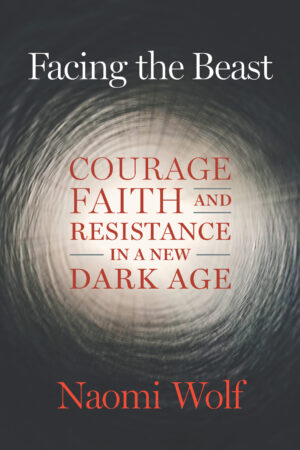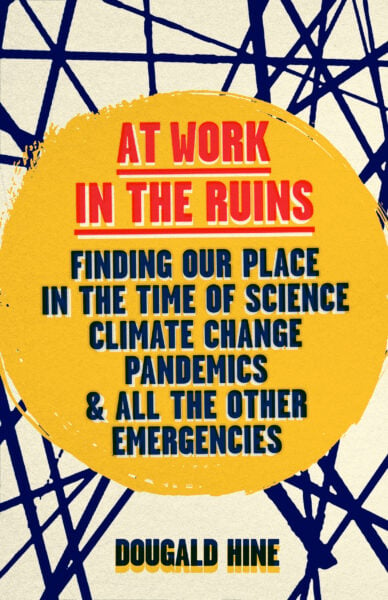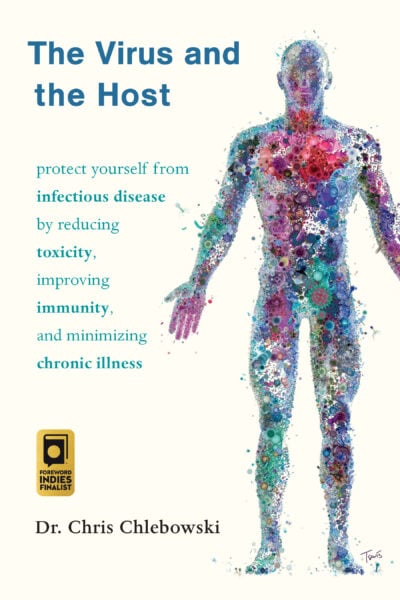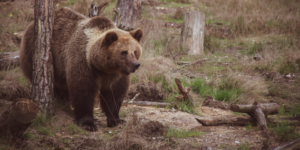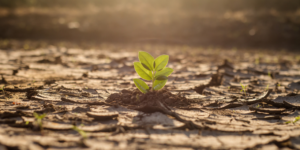Facing the Beast: Practicing Courage and Reflection
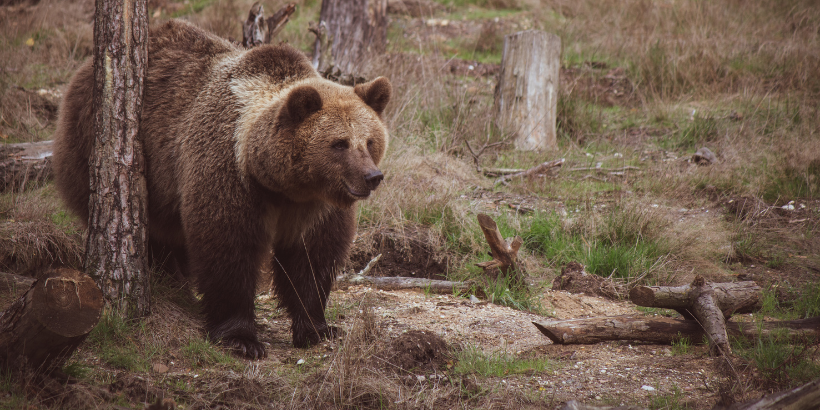
What does facing the beast mean? In this time of uncertainty, we must practice regular reflection to achieve optimal happiness and health. The metaphor below gives insight into confronting and facing it, regardless of what “the beast” is to you.
The following is. an excerpt from Facing the Beast by Naomi Wolf. It has been adapted for the web.
Facing the Beast
I was relaxing in our screened porch at our little cottage in the forest, feeling rather pleased with myself. It had been an arduous week of the usual combat for liberty. But there had been victories. I was reading a decorating magazine (we all have our vices). The grass was dewy; birds were loud. The morning was glorious.
I was feeling pioneerish and independent. I was alone in the house; Brian was traveling. I enjoyed the narrative moment: “Lady in the woods.”
Then I heard a thump about eight feet away, behind my head. It was an exasperated thump, like a teenager slamming the door to his room. Like, “Really??”
I glanced behind me and saw the enormous ears and forehead of a sizable brown bear, who was ducking insolently, clearly aware of me, to lower himself behind the trash cans.
I sped indoors, locking the door. I grabbed a weapon out of the hall closet. In my haste, I grabbed the weapon that looked like a rifle instead of the actual rifle, which was in a case. Thus I found myself locked in an upstairs bathroom, cowering, armed with a BB gun.
Meeting the Beast: A Re-Introduction
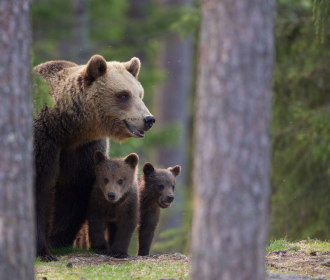 I sort of knew this bear. Brian had captured him on his outdoor wildlife camera about a year ago; what must have been this bear and his brother or sister, when the little ones were just adorable cubs. One of the cubs had nuzzled the trail cam till the mom had batted it away, urging her little ones to follow her deeper into the woods, far from the dangerous things of men. One of the cubs had now turned into this massive creature, what bear-watchers call a “sub-adult.”
I sort of knew this bear. Brian had captured him on his outdoor wildlife camera about a year ago; what must have been this bear and his brother or sister, when the little ones were just adorable cubs. One of the cubs had nuzzled the trail cam till the mom had batted it away, urging her little ones to follow her deeper into the woods, far from the dangerous things of men. One of the cubs had now turned into this massive creature, what bear-watchers call a “sub-adult.”
I saw, peering fearfully out of the window, that he was no longer cute and fat. He was thin, but massively muscled, and looked disoriented. He must have been eight feet long.
I raced into the upstairs bedroom and secured the windows. The bear left the garbage cans and followed me around the corner of the house. I could now see him pacing and sniffing directly opposite the bedroom windows, though on the ground level. There were windows all around the house on that level. Bears have been known to break into homes.
Dealing With Fear
I looked under the bed: hiding there could not save me if the bear made it into the house. I realized I was holding a BB gun and felt ridiculous. Even if I managed to shoot him, this would do nothing but enrage him. The thin bedroom doors, that I had thought so rustic and charming, could be broken down in no time by an angry animal of that size.
My heart pounded as I realized that he was not leaving; he continued pacing and circling, no matter where I went.
I went back into the bathroom and locked that door with its flimsy lock.
There he was again, outside on that side of the house, as if he was spotting me or as if he could scent me. Surely, he could smell my fear.
I cowered behind the bathroom curtain. The bear paused in his ran-sacking of the trash, stood up again on hind legs, looked right at me—or smelled right at me—and bared his long, sharp yellow teeth.
If I had had sympathy for the hungry teenager abandoned by his mom (or “emancipated” by his mom, as the bear-watching sites explain), it evaporated.
Handling the Beast: What Comes Next?
I was on the phone with Brian, frozen with fear.
“Make yourself big! Shout at him!” Brian instructed. That was impossible. I could not move. I could hardly breathe.
That would be it, surely, I thought, after the bear had exhausted the trash bag. He’d leave now, surely. But no. He came back toward me again like a nightmare and headed once more to circle the house.
I called the sheriff’s office.
Waiting It Out
Twice they told me that nothing could be done, and to stay inside. I don’t blame the Columbia County Sheriffs. They have issues to deal with more serious than a former city lady trapped in her house by a hungry bear.
But the bear kept circling right up against the walls of the house. This went on for an hour. Adrenaline poured through my bloodstream. I did wonder if I would die that day.
When I called back in spite of myself and begged the police for help, they told me to call again only if he managed to break into the house.
At certain points of extreme stress, I could not even bring myself to look outside to see where the bear was. What if I looked and couldn’t see him because he was already in the house? I went right into a place that is familiar to those of us with PTSD—a traumatized place where you freeze and where you engage in magical thinking.
Looking For the Beast
If I don’t look at the bear he won’t be there. If I don’t meet his gaze he won’t see me or smell me. I am somewhere else. I am not really here.
After an hour I was saved when brave colleagues of mine, who had been meeting nearby, drove down our wooded driveway, blowing their car horns. I raced down the steps, never so happy to see people in my life. Had the sound scared the bear away? He was now nowhere to be seen. My friend Reinette laughed at the sight of me scrambling to open the door to welcome them—still carrying my useless BB gun.
I think I was coherent, but I was in shock. An officer from the sheriff’s department arrived at the same time, bless him. Humans saved me. The aggressor, the wild animal, had been scared away, and not by me. I’d been a wreck, hopeless.
For days, I ruminated about the sharp yellow teeth of that bear, exposed as he raised his snout into the air, sniffing, like a scene from a horrifying fairy tale.
Reflecting on the Interaction
Why do I tell this story?
Because—the bear had been growing more and more comfortable emerging from the woods; he grew more and more comfortable exploring our trash, and then he took over territory by exploring our lawn. He was “habituated” ultimately, as bear-watchers say; he had ownership of the lawn and was circling the house to mark his territory. He was comfortable at last in stalking the homeowners.
He was here because I had done nothing to stop him. He was here because I let him slowly take over our home.
My not being able to look directly at the bear did not make me any safer. My denial put me in greater danger.
This all, of course, really happened. But that does not mean it is not also a metaphor.
Facing the Beast: A Metaphor
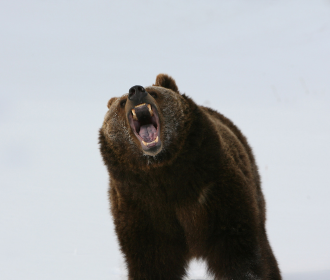 The same week that this happened, I also finalized my reporting about the Pfizer vaccines, showing—what I knew for months I would eventually find.
The same week that this happened, I also finalized my reporting about the Pfizer vaccines, showing—what I knew for months I would eventually find.
The heart of the manufacture and distribution of millions of doses of the mRNA vaccines that have caused such a swath of death and destruction throughout North America and Western Europe is enmeshed with the plans, methods, and manufacturing infrastructure of our existential adversary. The enemy is within our very bodies.
The Enemy Within Our Bodies
Since I first started reading the reports produced by the 3,250 medical and scientific experts of the WarRoom/DailyClout Pfizer Documents Analysis Volunteers team, based on the 450,000 Pfizer documents released under court order, I knew I was seeing not just medicine gone wrong, not just a greedy pharmaceutical company and a regulatory agency that was fully corrupted, but rather, or additionally, I was seeing a massive act of war.
With the provenance of the vaccines and tests, you can see yet another mechanism, yet another core methodology of this warfare.
Mapping these points of evidence, I think you may start to see what I see. This all means, of course, that we are staring into the abyss right now. Traumatized or not, we all need to snap out of denial.
Snapping Out of Denial
We let our adversary come too close to us. Into our very bloodstreams. What does it mean, to “face the beast”? Does it mean to face at last the role of China—and of the WEF, the WHO, and of our own formerly democratic government and those of others’—in this catastrophic past three years?
Does it mean facing the fact that evil on an unimaginable, even supernatural scale is having its way with our world?
Or does it mean: facing the mirror; facing the ugliness, the hatred, the credulity that manifested so hideously from inside the very selves of so many of us?
You decide.
Meanwhile, we need to turn and face the ravening beast.
Recommended Reads
Only Different in Degree: A New Perspective on Diagnoses & Treatment
Recent Articles
Addressing the pressing issues affecting everyday Americans is essential—and one of our nation’s most profound challenges is the devastating impact of mass layoffs. Layoffs upend people’s lives, cause enormous stress, and lead to debilitating personal debt. The societal harm caused by mass layoffs has been known for decades. Yet, we do little to stop them.…
Read MoreWhat does facing the beast mean? In this time of uncertainty, we must practice regular reflection to achieve optimal happiness and health. The metaphor below gives insight into confronting and facing it, regardless of what “the beast” is to you. The following is. an excerpt from Facing the Beast by Naomi Wolf. It has been adapted for the…
Read MoreWe’ve all heard of the phrases “time flies” and “time heals all wounds,” but what really is time, and how does it impact our lives? The concept of time may be even more powerful than we think, especially when it comes to the money we save and spend. The following is an excerpt from The…
Read More“Climate change asks us questions that climate science cannot answer,” — Dougald Hine When it comes to climate change, it seems as if there are always new questions arising: How did we get to this point? How can we stop it? What’s next? Unfortunately, there is no black-and-white, straightforward answer to any of them —…
Read MoreDougald Hine has spent most of his life talking to people about climate change. And then one afternoon in the second year of the pandemic, he found he had nothing left to say. Why would someone who cares so deeply about ecological destruction want to stop talking about climate change now? In the excerpt below, Hine…
Read More

